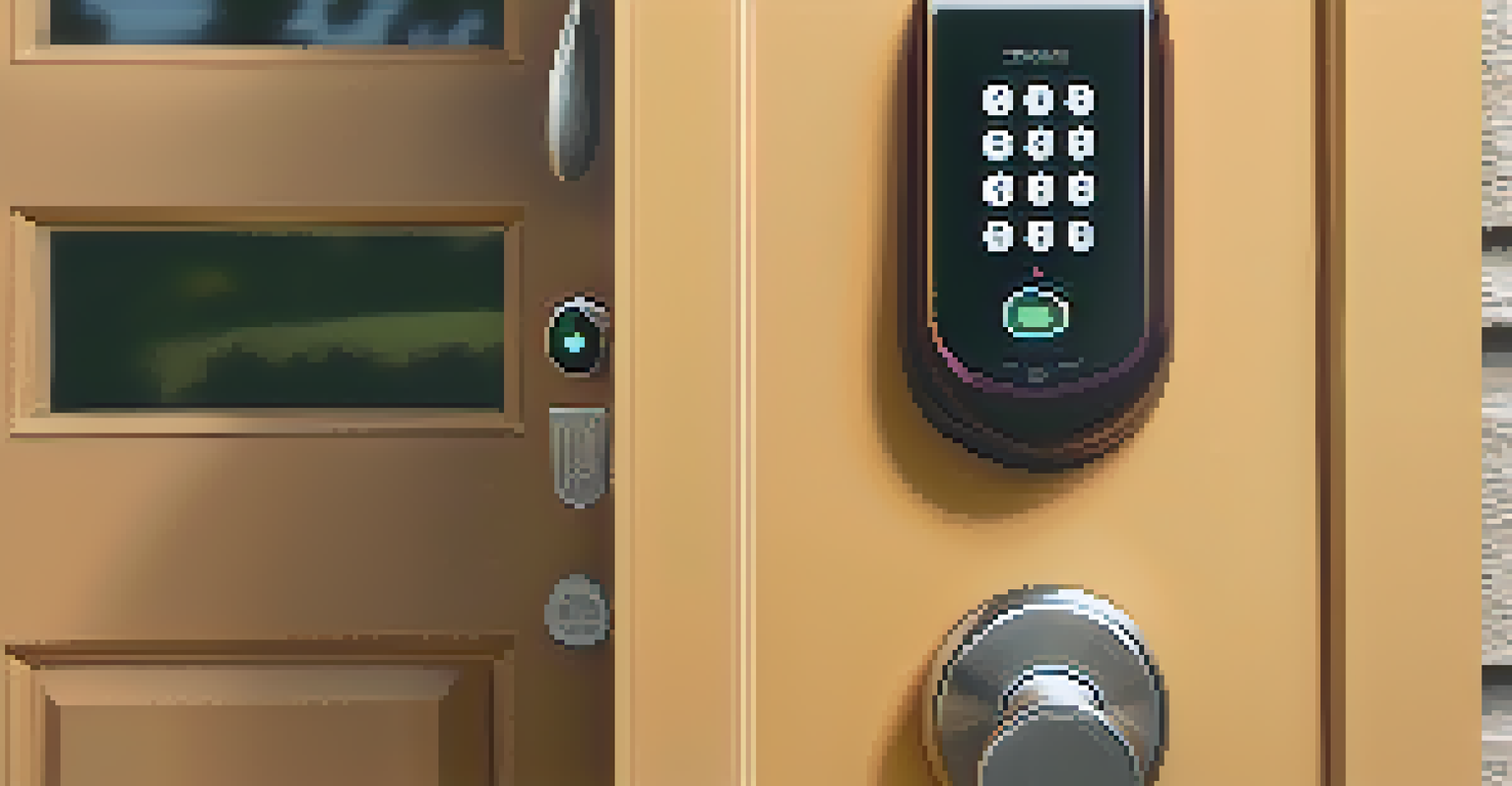Protecting Your Home with Smart Home Security Systems

Understanding Smart Home Security Systems
Smart home security systems have revolutionized how we protect our homes. Unlike traditional systems that rely solely on alarms, these modern solutions integrate various technologies, including cameras, motion sensors, and smart locks. This interconnected approach provides homeowners with a comprehensive security network that can be monitored remotely.
The best way to predict the future is to create it.
For example, imagine being at work and receiving a notification on your phone about unexpected movement in your backyard. With a smart home security system, you can access live video feeds and even communicate with intruders through two-way audio. This level of engagement and control enhances your ability to respond quickly to potential threats.
Ultimately, understanding these systems is the first step toward securing your home. As we dive deeper into the benefits and features of smart home security, it becomes clear why they are becoming a popular choice among homeowners.
Key Features of Smart Security Systems
Smart home security systems come packed with features designed to keep you safe and informed. One of the standout features is remote access, allowing you to monitor your property from anywhere using your smartphone or tablet. This means you can check in on your home while on vacation or even at work.

Another key feature is automation. Many systems can be programmed to activate cameras and alarms at specific times or when certain conditions are met, such as when you leave or arrive home. This not only enhances security but also provides peace of mind, knowing that your home is always being watched.
Smart Systems Enhance Home Security
Smart home security systems integrate various technologies for comprehensive monitoring and control.
Lastly, integration with other smart devices, like lights and thermostats, can further enhance security. For instance, you can set your lights to simulate your presence at home, deterring potential burglars while you’re away.
Benefits of Using Smart Security Systems
The benefits of smart home security systems extend beyond just monitoring your property. One of the primary advantages is the enhanced peace of mind they provide. Knowing that you can keep an eye on your home at all times can alleviate anxiety, especially for those who travel frequently.
Security is not a product, but a process.
Moreover, these systems often come with advanced features like facial recognition and artificial intelligence, which can reduce false alarms and improve overall safety. This means you’ll receive alerts only when there’s a legitimate threat, allowing you to focus on what matters most.
Additionally, many insurance companies offer discounts for homes equipped with smart security systems. This can lead to substantial savings on your home insurance premiums, making the investment not just a security measure but also a financially smart decision.
Choosing the Right Smart Security System
With a myriad of options available, choosing the right smart security system can be overwhelming. Start by identifying your specific needs—consider factors such as the size of your property and the areas that require monitoring. This will help you narrow down the features that are most important to you.
It's also crucial to look for systems that offer scalability. As your needs change, whether you want to add more cameras or integrate new smart devices, your security system should be able to grow with you. Flexibility is key in ensuring long-term satisfaction.
Peace of Mind with Smart Features
These systems offer features like remote access and automation, providing homeowners with reassurance.
Lastly, read reviews and seek recommendations from friends or family who have experience with smart security systems. Their insights can help you avoid pitfalls and find a solution that truly meets your requirements.
Installation and Setup of Smart Security Systems
Setting up a smart home security system can be a straightforward process, especially with many products designed for DIY installation. Most systems come with easy-to-follow instructions, making it possible for homeowners to install cameras, sensors, and alarms without professional help. This can save both time and money.
However, for those who prefer a hands-off approach, hiring a professional installer can ensure optimal placement of devices and seamless integration with existing technology. A professional can provide insights that you might not consider, enhancing the effectiveness of your security system.
Regardless of the installation method, it’s essential to take the time to properly configure your system. This includes setting up alerts, creating user accounts, and ensuring that your devices are connected to a secure network. Proper setup is critical for maximizing the benefits of your smart security system.
Maintaining Your Smart Security System
Once your smart home security system is up and running, regular maintenance is key to its effectiveness. This includes checking the batteries in wireless devices, updating software, and reviewing camera angles to ensure that all areas are being monitored effectively. A little maintenance can go a long way in keeping your system reliable.
Additionally, reviewing your security footage periodically can help you understand the patterns around your home. You might notice unusual activity or even areas that require additional security measures. This proactive approach can enhance your overall safety.
Choosing the Right System Matters
Understanding your specific needs and seeking recommendations helps in selecting the ideal smart security system.
Remember, a smart security system is only as good as how well it’s maintained. Staying on top of updates and checks ensures that you’re always one step ahead of potential threats.
The Future of Home Security Technology
As technology continues to evolve, so too does the landscape of home security. The future is likely to bring even more advanced features, such as improved AI capabilities that can differentiate between harmless and suspicious behavior. This could significantly reduce false alarms and enhance the safety of your home.
Moreover, the integration of smart home devices will become more seamless, allowing for automated responses to security breaches. For example, if a camera detects motion, your system might automatically lock doors, turn on lights, and alert you—all without you lifting a finger.

In conclusion, staying informed about emerging trends in home security technology can help you adapt your system to meet future challenges, ensuring that your home remains a safe haven for you and your loved ones.